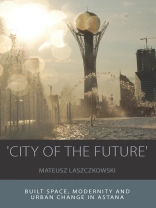Astana, the capital city of the post-Soviet Kazakhstan, has often been admired for the design and planning of its futuristic cityscape. This anthropological study of the development of the city focuses on every-day practices, official ideologies and representations alongside the memories and dreams of the city’s longstanding residents and recent migrants. Critically examining a range of approaches to place and space in anthropology, geography and other disciplines, the book argues for an understanding of space as inextricably material-and-imaginary, and unceasingly dynamic – allowing for a plurality of incompatible pasts and futures materialized in spatial form.
Jadual kandungan
List of Maps, Figures and Tables
Acknowledgments
Note on Transliteration and Translation
Introduction: Pathways into the ‘City of the Future’
- Astana, Kazakhstan and the Global Lives of Modernist Urbanism
- Anthropology’s Space
- Space and Time
- Theorizing the City Anthropologically
- Fieldwork in the ‘City of the Future’
Chapter 1. Materializing the Future: Images and Practices
- Deconstruction, Reconstruction
- The Cityscape of the Future
- Becoming ‘Contemporary’
- The Roots of Disenchantment, and Its Limits
Chapter 2. Performing Urbanity: Migrants, the City and Collective Identification
- Identities beyond Representation
- Urbanity and Rurality in Kazakhstan
- Migration to Astana
- Migrants’ Stories
- Kumano: A Pioneer Settles Down
- Kirill and Gisele: Love on the Move
- Bakytgul: Caught Up in Deferrals
- Aynura: The Girl Who Played the Accordion
- Madiyar: The Struggling Southerner
- Embodying Identity
Chapter 3. Tselinograd: The Past in the ‘City of the Future’
- Building Tselinograd
- Nostalgia and Spatial Intimacy
- Walking in Tselinograd
- Tselinograd’s Glory
Chapter 4. Celebration and the City: Belonging in Public Space
- What Is Public Space?
- The Setting: City Squares
- Public Holiday Celebrations
- …in Late-Soviet Tselinograd
- …in Astana
- Whose Celebration, Whose City?
- Public Space Reopened
Chapter 5. Fixing the Courtyard: Mundane Place-Making
- Shifting Frameworks
- Material Place-Making in the Dvor
- Digression: Things Make a Difference
- The KSK Takeover
Chapter 6. Playing with the City: ‘Encounter’ in Astana
- What is ‘Encounter’?
- Game Types
- ‘Encounter’ as Play
- Play or Politics: Carnival, Stiob and ‘Encounter’
- ‘Encounter’s Creativity’
- Creasing Space
Conclusion
References
Index
Mengenai Pengarang
Mateusz Laszczkowski is Assistant Professor at the Institute of Ethnology and Cultural Anthropology, at the University of Warsaw, Poland. In 2007-2012 he conducted his doctoral research at the Max Planck Institute for Social Anthropology in Halle/Saale, Germany.












